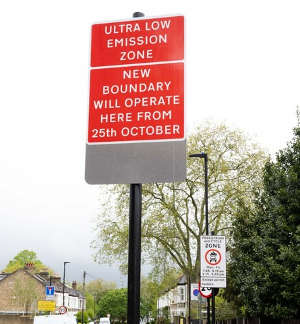Exploring Potential “Pay-per-Mile” Theories Surrounding London ULEZ Cameras

Introduction
London, known for its efforts to combat air pollution and promote cleaner transport, introduced the Ultra Low Emission Zone (ULEZ) in April 2019, with the aim to reduce harmful emissions from vehicles by imposing charges on those that do not meet specific emission standards.
As the ULEZ scheme evolves, there has been speculation about the implementation of a “pay-per-mile” scheme, wherein drivers would be charged based on the distance they travel within the zone.
The current ULEZ scheme charges older private and motor trade polluting vehicles – typically pre-2015 diesel cars and pre-2006 petrol vehicles – for driving within the zone in a bid to encourage motorists to buy newer, less polluting cars.
Mr Khan is pressing ahead with the plans despite many respondents opposing it in a consultation, he says the expansion will prevent 27,000 tons of CO2 being emitted in outer London.
According to reports Sadiq Khan is planning to use traffic cameras that enforce the ultra-low emission zone (ULEZ) in London to help run a future “pay-as-you drive” scheme.
Around 200,000 more vehicles will be hit with the £12.50 daily charge in August when ULEZ expands across Greater London, beyond the M25, reaching parts of the Home Counties.
In revolt, several councils surrounding the capital have refused to sign an agreement allowing Transport for London (TfL) – of which Mr Khan is chairman – to install street signs and cameras warning drivers they are approaching the clean air zone.
Mr Khan said earlier in the year that he has asked TfL chiefs to investigate developing a scheme which would use more “sophisticated technology” to charge road users, according to the Telegraph.
Addressing the London Assembly, he said: “ANPR (automatic numberplate recognition) cameras could form part of the potential operation of such a scheme, but no proposals have been developed.”
Mr Khan has previously hinted that he is looking to adopt a system like Singapore, where sensors on gantries monitor private and motor trade vehicle movements and charge more for travelling at peak times.
Christina Calderato, TfL’s strategy director, told an Assembly transport committee this week that TfL was keen to introduce charging at the “earliest possible stage” but said a dialogue with Londoners is needed.
A spokesperson for the Mayor of London said: “TfL has outlined how one future option could be to abolish existing charges and replace them with a single simpler road user charging scheme which could take into account factors such as local public transport availability, employment and income, but the technology required is still many years away.
Any formal proposals which could be developed in the future would be subject to consultation with information provided on detailed scheme proposals and their likely impacts.”
ULEZ Success
ULEZ has been successful in improving air quality within the zone. It requires vehicles entering the designated area to meet stringent emission standards. Initially, the ULEZ covered the same area as the Congestion Charge Zone but was extended to include the entire area within the North and South Circular roads in October 2021.
This extension significantly expanded the zone, impacting a larger number of vehicles. All vehicles must still have an MOT certificate registered by a qualified MOT Tester in the motor trade, plus a valid private or motor trade insurance policy.
The Pay-per-Mile Theory
The concept of a pay-per-mile system revolves around the idea of charging drivers based on the distance they travel within the ULEZ. Currently, the ULEZ operates on a fixed daily charge basis, irrespective of how much a vehicle is driven within the zone.
However, implementing a pay-per-mile system would introduce a more dynamic and equitable approach, aligning charges directly with usage.
Advantages of a Pay-per-Mile System
Incentivizing cleaner transport: A pay-per-mile system could encourage drivers to opt for cleaner and more fuel-efficient vehicles, reducing emissions and congestion within the ULEZ.
Fairness and affordability: A distance-based charging system would provide a fairer approach by ensuring that drivers who use the ULEZ sparingly pay less, while those who drive longer distances within the zone contribute more. This could alleviate financial burdens on occasional ULEZ users.
Revenue generation: A pay-per-mile system has the potential to generate additional revenue, which could be reinvested in improving sustainable transport infrastructure, subsidizing cleaner vehicle options, or enhancing public transport systems.

Challenges and Considerations
Privacy concerns: Implementing a pay-per-mile system would require monitoring and tracking vehicle movement within the ULEZ. Addressing privacy concerns and ensuring data protection would be crucial to gaining public acceptance for such a system.
Infrastructure requirements: The implementation of a distance-based charging system would necessitate a robust technological infrastructure, including GPS tracking and associated backend systems, to accurately record and calculate the charges.
Equity and exemptions: Care must be taken to ensure that any pay-per-mile system considers the impact on different socio-economic groups and does not disproportionately affect certain communities. Exemptions for essential and low-income users may need to be considered to maintain fairness.
Conclusion
While the introduction of a pay-per-mile system in conjunction with ULEZ cameras in London remains speculative at this point, it presents an intriguing possibility for enhancing the effectiveness and fairness of the existing ULEZ scheme.
The dynamic nature of such a system could incentivize cleaner transport choices while generating additional revenue for sustainable transport initiatives.
However, addressing concerns related to privacy, equity, and infrastructure will be crucial to successfully implementing any future pay-per-mile scheme.
As London continues its journey towards cleaner and greener transport, discussions around the evolution of ULEZ and related policies will likely continue to shape the city’s environmental landscape.






